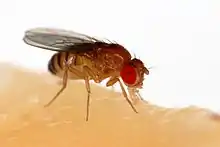Daisho (Drosophila peptide)
Daisho (Dso) is an antimicrobial peptide gene family of the fruit fly Drosophila melanogaster. Two Daisho genes (Dso1, Dso2) are encoded in tandem in the fruit fly genome, one shorter than the other. This pair of genes with different length was named "Daisho" in reference to Daisho Japanese swords, which come in pairs with one shorter than the other.[1]
| Daisho (Drosophila peptide) | |||||||
|---|---|---|---|---|---|---|---|
 The fruit fly, Drosophila melanogaster | |||||||
| Identifiers | |||||||
| Organism | |||||||
| Symbol | Dso | ||||||
| UniProt | P82705 | ||||||
| |||||||
The Daisho genes are regulated by Drosophila Toll-like receptor signalling.[2] Daisho peptides protect flies against filamentous fungi, particularly Fusarium and also Aspergillus.[1] Daisho peptides are part of the Drosophila antifungal effector peptide response, which includes the gene families Bomanin, Drosomycin, Metchnikowin, and Baramicin.
References
- Cohen LB, Lindsay SA, Xu Y, Lin SJ, Wasserman SA (2020-01-23). "The Daisho Peptides Mediate Drosophila Defense Against a Subset of Filamentous Fungi". Frontiers in Immunology. 11: 9. doi:10.3389/fimmu.2020.00009. PMC 6989431. PMID 32038657.
- Uttenweiler-Joseph S, Moniatte M, Lagueux M, Van Dorsselaer A, Hoffmann JA, Bulet P (September 1998). "Differential display of peptides induced during the immune response of Drosophila: a matrix-assisted laser desorption ionization time-of-flight mass spectrometry study". Proceedings of the National Academy of Sciences of the United States of America. 95 (19): 11342–11347. doi:10.1073/pnas.95.19.11342. PMC 21644. PMID 9736738.
This article is issued from Wikipedia. The text is licensed under Creative Commons - Attribution - Sharealike. Additional terms may apply for the media files.